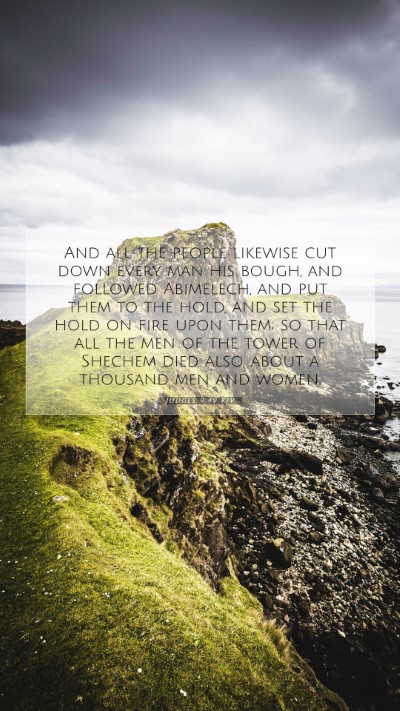Understanding Judges 9:49 - A Comprehensive Bible Verse Commentary
Judges 9:49 is a verse situated in the narrative of Abimelech, a judge of Israel who was the son of Gideon. This verse describes a pivotal moment during Abimelech's violent campaign to solidify his power. Through the analysis of public domain commentaries, this explanation aims to provide a deeper understanding of this scripture.
Bible Verse Context
The book of Judges illustrates a cyclical pattern of Israel's behavior, showcasing the recurring themes of sin, oppression, supplication, and deliverance. Judges 9 specifically deals with Abimelech's rise to power and subsequent demise, making it a crucial section for understanding the consequences of ambition devoid of divine guidance.
Verse Summary
In Judges 9:49, the people of Shechem are instructed to take branches and follow Abimelech's command. This action embodies the theme of rebellion against rightful leadership and the chaos that ensues. The verse manifests both a literal and metaphorical gathering of strength to support a leader who is not divinely appointed.
Commentary Insights
-
Matthew Henry:
Henry emphasizes the folly of the people of Shechem in supporting Abimelech blindly. He notes that their decision was driven by a desire for control and power rather than adherence to God's anointed. The branches they gathered symbolize both unity in their misguided choice and the eventual downfall that follows such rebellion against divine order.
-
Albert Barnes:
Barnes comments on the historical implications of this action, explaining how it signifies the desperate measures taken by Abimelech to solidify his reign. The use of branches as weapons reflects the chaotic nature of leadership without divine sanction and the violent consequences of such ambition.
-
Adam Clarke:
Clarke notes the significance of the “branches” in scripture, connecting this action to Old Testament traditions. He illustrates how these branches serve as symbols of both life and death, indicating the dichotomy of Abimelech's ruling: while it seemed lush and prosperous, it would ultimately lead to destruction for many.
Themes and Practical Applications
The themes in Judges 9:49 continue to resonate today. This verse teaches about the risks of following leaders for the wrong reasons and highlights the moral and ethical considerations in leadership choices.
- Ambition Without Divine Guidance: The pursuit of power can lead to disastrous outcomes when it disregards God's will.
- Consequences of Rebellion: The people of Shechem illustrate the human tendency to align with powerful figures, often leading to national and personal ruin.
- Symbolism of Decisions: The metaphor of branches speaks to the broader implications of actions driven by ambition over faith.
Bible Cross References
- Judges 8:30-31 - Gideon’s legacy and the roots of Abimelech’s ambition.
- 1 Samuel 8:5-7 - The desire for a king illustrates Israel’s inclination toward human leadership.
- 2 Samuel 15:13-14 - The rebellion that leads to Absalom's rise mirrors the chaos of Abimelech’s story.
Conclusion
The exegesis of Judges 9:49 uncovers the multi-layered complexities of human ambition, rebellion against divine structure, and the resultant chaos in leadership. Scholars and readers alike should deeply reflect on the implications of their own choices in leadership and allegiance.


